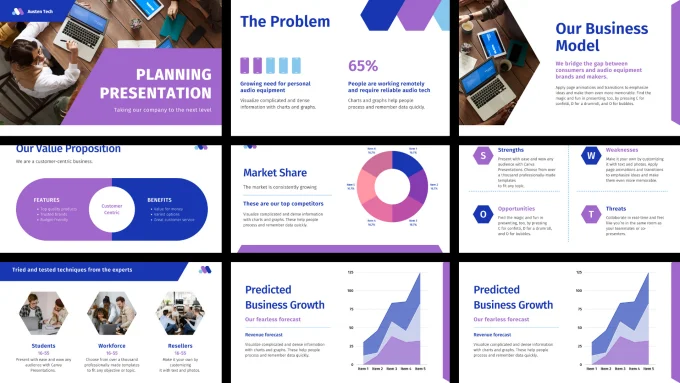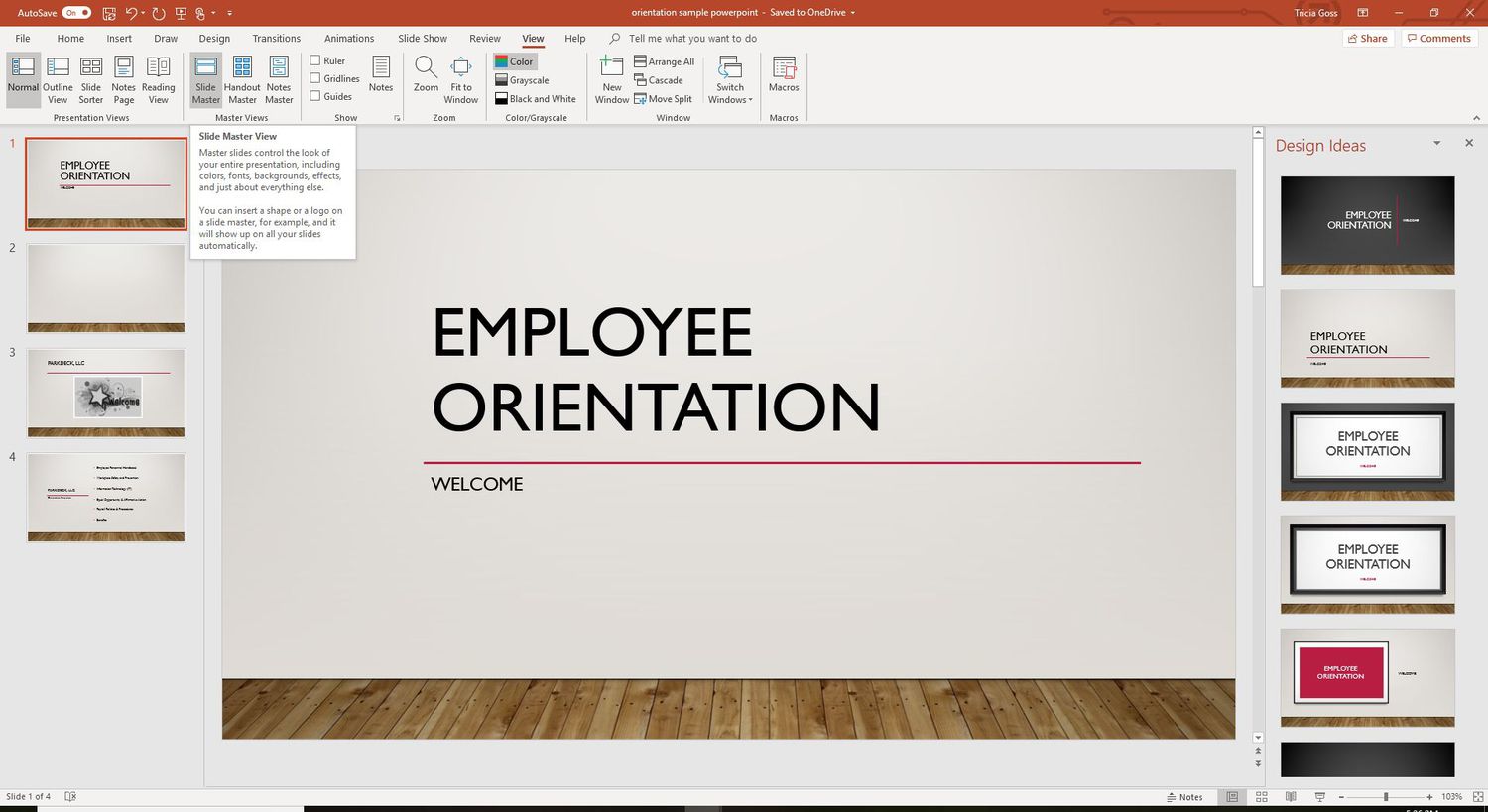What is a Presentation?

Presentations are effective tools of communication. Presentations can capture the audience's attention and transfer information, ideas, or concepts with an audience through easy and simple displays using engaging visuals, bullet points, and verbal expressions. Presentations are commonly used in professional and economic settings due to these qualities.
Definition and Purpose of a Presentation
A presentation is a structured and deliberate method of conveying information, ideas, or messages to an audience through various modes of communication. The primary purpose of a presentation is to inform, persuade, inspire, motivate, build goodwill, or introduce a new idea or product. Presentations are invaluable tools in business, education, and public speaking, serving to deliver valuable information, change opinions, or inspire action. Whether in a formal business setting or an academic environment, a well-crafted presentation can effectively communicate key messages and engage the audience.
Why Choosing the Right Presentation Software Matters
You can achieve the best results with a well-prepared, understandable, and engaging presentation. You need to choose the right presentation software to achieve these end-results.
Do you need information about business planning? Click What is a Business Model Canvas, Mastering Value Proposition and Employee Value Proposition Canvas & How To Soft Launch Successfully to see the details.
The Importance of Presentation Skills for Business and Education
Presentation skills are critical skills especially in academic and professional environments. Education is built upon engaging and informative presentations, sometimes just verbal and sometimes supported with additional materials and presentations. Similarly, presentations are used in business to pitch ideas, drive projects forward, and give reports regarding the projects.
Presentations are essentially communication tools designed to help you deliver your ideas to listeners in an effective and concise manner. Presentations are commonly used in academic and professional settings.
Key Elements of a Presentation

A well-structured presentation typically consists of several key elements, including:
Message and Content
The message or content of a presentation is the core information, ideas, or messages that the presenter aims to convey to the audience. This includes key points, supporting evidence, and visual aids. The message should be clear, concise, and relevant to the audience. Utilizing visual elements like slides, graphs, and other visual aids can enhance the delivery and retention of the key points, making the presentation more impactful.
Audience and Context
Understanding the audience and context of the presentation is crucial for effective communication. The presenter should consider the audience’s needs, interests, and knowledge levels, as well as the setting and purpose of the presentation. Tailoring the message and delivery to the audience’s expectations ensures that the presentation resonates and achieves its intended purpose. Whether it’s a sales presentation, a business report, or an educational lecture, knowing your audience and the context helps in crafting a successful presentation.
Check out the Ultimate Guide to Lean Canvas, Business Venture Meaning,Business Model Canvas & Value Proposition to learn more about Business Development and Value Creation Strategies.
Types of Presentations

There are various types of presentations, each serving a different purpose and requiring a unique approach.
Informative Presentation
An informative presentation aims to increase the audience’s understanding of a particular topic. This style is often used in academic and research settings and typically involves clear visuals, relatable examples, and a logical organization of content. Effective informative presentations have a clear structure, credible evidence, engaging delivery, and supporting visuals.
Informative presentations can be used to educate the audience on a new topic, provide updates on a current issue, or share research findings. The key characteristics of an informative presentation include:
-
Clear and concise language
-
Use of visual aids such as slides, graphs, and images
-
Organization of content in a logical and easy-to-follow manner
-
Use of examples and anecdotes to illustrate key points
-
Engagement with the audience through questions and discussion
Informative presentations can be delivered in various settings, including academic conferences, business meetings, and community events. The key to a successful informative presentation is to provide valuable information in a clear and engaging manner, leaving the audience with a better understanding of the topic.
Best Free Presentation Software in 2024 for your Business

Top Free Presentation Tools to Consider
-
Google Slides (pros, cons, price…): Google Slides are completely free and it allows easy collaboration. However, it lacks some features compared to other tools.
-
Canva (pros, cons, price…): Canva is another free tool with some optional paid features. Canva is one of the most commonly used tools for presentation with its user-friendly nature, extensive library of design elements and ready templates. However, using canva requires an internet connection and many of the templates might require the paid option.
-
Prezi (pros, cons, price…): Prezi creates dynamic and engaging presentations, it is best-fit for presentations that want to utilize interactive storytelling. The options are limited with the free option.
-
Microsoft PowerPoint Online (pros, cons, price…): Microsoft PowerPoint integrates seamlessly with most applications. However, it requires internet connection to be used and some of its features are limited to the free version.
-
LibreOffice Impress (pros, cons, price…): LibreOffice Impress is a completely free application and it does not require internet connection for designs. However, the user-interface can be complex and the templates can be out-of-date with the latest visual trends.
Comparison of Features and Usability
Strengths and Weaknesses of Each Software
You can see the strengths and weaknesses of each presentation software compared based on their features and usability in the table below.
|
Software |
Strengths |
Weaknesses |
|
Google Slides |
- Cloud-Based: Accessible from anywhere. |
- Limited Advanced Features: Some advanced features may be missing compared to others. |
|
- Easy Collaboration: Real-time collaboration and sharing. |
- Export Limitations: Limited export options. |
|
|
- Free: Completely free to use. |
||
|
Canva |
- User-Friendly Interface: Easy drag-and-drop functionality and templates. |
- Internet Dependency: Requires an internet connection to use. |
|
- Design Tools: Extensive library of graphics and design elements. |
- Paid Features: Advanced features and design options are available in paid plans. |
|
|
Prezi |
- Dynamic Presentations: Creates visually engaging and interactive presentations. |
- Complex Interface: Higher learning curve. |
|
- Cloud-Based: Accessible from anywhere. |
- Limited Free Features: Some features are restricted in the free version. |
|
|
Microsoft PowerPoint Online |
- PowerPoint Format Compatibility: High compatibility with PowerPoint files. |
- Internet Dependency: Requires an internet connection to use. |
|
- Easy Collaboration: Integration with Office 365 for collaboration. |
- Feature Limitations: May lack some features available in the desktop version. |
|
|
LibreOffice Impress |
- Fully Featured: Offers a wide range of features and tools. |
- User Interface: Can be more complex compared to modern software. |
|
- Offline Use: Does not require an internet connection. |
- Modern Templates: May lack modern templates and designs. |
Integration with Other Tools and Platforms
|
Softwares |
Integrations |
|
Google Slides |
It is easy to collaborate and share Google Slides across platforms such as Google Docs, Sheets, and Drive. |
|
Canva |
Canva offers easy integrations through exporting and sharing across many format options. |
|
Prezi |
Prezi is an engaging tool for live presentations and it integrates easily with video tools. |
|
Microsoft PowerPoint |
Microsoft PowerPoint offers quite easy integrations between other Microsoft tools. |
|
LibreOffice Impress |
Integrating LibreOffice with other platforms is usually limited, but it can be integrated with other Libre tools. |
How to Choose the Best Software for Your Needs
Best Presentation Tool Options for Business vs. Education
|
Software |
Best for Business |
Best for Education |
|
Google Slides |
Strengths: |
Strengths: |
|
- Easy Collaboration: Real-time collaboration, ideal for team projects. |
- Collaboration: Real-time editing and sharing facilitate group work. |
|
|
- Integration with Google Workspace: Seamless integration with other Google apps. |
- User-Friendly: Simple and accessible for both teachers and students. |
|
|
- Cloud-Based: Accessible from any device, useful for remote work. |
- Free: Completely free, which is beneficial for educational institutions with limited budgets. |
|
|
Weaknesses: |
Weaknesses: |
|
|
- Limited Advanced Features: May lack some advanced business presentation tools. |
- Basic Design Options: Limited design features compared to specialized tools. |
|
|
- Export Limitations: May not support all business-specific file formats. |
- Less Suitable for Complex Presentations: Not ideal for complex or highly interactive educational content. |
|
|
Canva |
Strengths: |
Strengths: |
|
- Design Flexibility: Advanced design tools for creating professional presentations. |
- Templates: Offers a wide variety of educational templates and resources. |
|
|
- Easy to Use: Intuitive interface suitable for creating visually appealing business presentations. |
- Engaging Visuals: Easy to create visually engaging content for classroom use. |
|
|
Weaknesses: |
Weaknesses: |
|
|
- Paid Features: Advanced features require a paid plan, which can be costly for some businesses. |
- Internet Dependency: Requires an internet connection, which might be a limitation in some educational settings. |
|
|
- Limited Offline Access: Limited functionality without internet access. |
- Advanced Features for Education: Some advanced tools might be locked behind a paywall. |
|
|
Prezi |
Strengths: |
Strengths: |
|
- Dynamic Presentations: Great for creating visually compelling business pitches and reports. |
- Interactive Learning: Helps create engaging and interactive presentations for students. |
|
|
- Cloud-Based: Accessible and easy to update from anywhere. |
- Visual Appeal: High-impact visuals can enhance learning experiences. |
|
|
Weaknesses: |
Weaknesses: |
|
|
- Complex Interface: Steeper learning curve, which can be a drawback for quick business needs. |
- Learning Curve: Complexity might be challenging for younger students or those unfamiliar with the tool. |
|
|
- Limited Free Features: Free version has restricted functionality. |
- Limited Offline Use: Less effective without an internet connection. |
|
|
Microsoft PowerPoint Online |
Strengths: |
Strengths: |
|
- Familiarity: Widely used in business environments, making it a familiar choice. |
- Familiar Interface: Many students and educators are already familiar with PowerPoint. |
|
|
- Integration with Microsoft Office: Seamless integration with other Office tools. |
- Collaboration Features: Good collaboration features through Office 365 integration. |
|
|
Weaknesses: |
Weaknesses: |
|
|
- Internet Dependency: Requires internet connection for the online version. |
- Limited Features in Free Version: Some advanced features are only available in paid versions. |
|
|
- Feature Limitations: Some features of the desktop version are not available online. |
- Complexity for Younger Students: Can be too complex for very young students or beginners. |
|
|
LibreOffice Impress |
Strengths: |
Strengths: |
|
- Fully Featured: Offers a wide range of presentation tools and options. |
- Offline Use: Can be used without an internet connection, which is useful in diverse educational settings. |
|
|
- Cost-Free: Completely free, without the need for any subscriptions. |
- Customizability: Highly customizable, suitable for a range of educational presentations. |
|
|
Weaknesses: |
Weaknesses: |
|
|
- User Interface: Can be less intuitive compared to more modern tools. |
- Learning Curve: May have a steeper learning curve for those unfamiliar with its interface. |
|
|
- Compatibility Issues: Potential compatibility issues with other software and file formats. |
- Modern Design Features: Lacks some of the modern design features available in newer tools. |
Factors to Consider: Templates, Design Options, Collaboration Features, Interactive Presentations
Let’s list some key factors you should consider before choosing a presentation software:
-
You should prioritize the ease of use of the program.
-
Check out any collaboration features within the program
-
Look at the different templates and designs
-
Make sure that there is integration opportunities with other programs
-
What is the cost of the program? Is the free version sufficient or would you need any additional versions?
-
Does the software offer offline editing options? Is it a priority for your work?
There are many free presentation softwares such as Google Slides, Canva, Prezi, Microsoft PowerPoint, and LibreOffice Impress. Each of these softwares offer different advantages, disadvantages, features, levels of usability, and integration opportunities. You can choose a different softwares based on your priorities and the topic of your presentation.
How to Prepare a PowerPoint Presentation

Step-by-Step Guide to Creating a PowerPoint Presentation
-
Setting Up Your Slide Deck: First of all, choose a slide deck that is harmonious with the topic of your presentation and the expectations of the people you will make the presentation for.
-
Adding Text, Images, and Graphics: You should already have an outline determined for your presentation and hopefully did your research! Now all you need to do is to add texts, images, and graphics to your slide in the most concise and to-the-point manner.
-
Using Animations and Transitions Effectively: Using different visual tools can be quite efficient when it comes to capturing the attention of your listeners and engaging them in the presentation. Utilize animations and transitions effectively.
Tips for Designing Professional PowerPoint Slides with Visual Aids
Font Selection and Color Schemes: Be consistent with your choice of colors and fonts. The best way to apply this rule is to choose 3 or 4 main colors. For example, you can choose white, dark yellow, and dark blue for your theme. You can choose the dark blue as your background color and use white and dark yellow for your texts and titles. For fonts, you can choose 2 fonts; one for titles and one for texts, or you can use the bold and normal version of the same font.
Best Practices for Layout and Spacing: You should always aim for clarity in your layout and spacing. For a professional look, maintain a harmonious alignment.
Using Visual Aids to Enhance Your Message: Use high-quality visuals all throughout your presentation and support your written content with explanatory visuals like graphs and tables. Use different visual tools such as contrasts, animations, and visualizations.
Do you need to contact to the best web design agency for your business? Click to discover.
Common Mistakes to Avoid in PowerPoint Presentations
Overloading Slides with Information:
-
Do not fill your presentation with too much text.
-
Bullet points are a must for slides, but do not overuse them.
Poor Visual Design Choices
-
Utilize contrasts in your slide, make your written text readable.
-
Be consistent with your design through the same fonts and color schemes.
-
Low-quality images will make your presentation look unprofessional, use high-quality and understandable images.
Ignoring the Flow of the Presentation
-
Add your contexts with an order of titles and subtitles.
-
Create a flow of ideas within your presentation.
Preparing a PowerPoint presentation requires following a few easy steps and principles. Choose your topic, outline your content, choose a coherent theme and visuals for your presentation. Focus on visual factors such as contrast, font selection, and layout. Create an easy-to-follow flow of presentations.
Essential Presentation Skills for Success

Mastering Public Speaking Techniques
How to Engage Your Audience:
-
Ask questions throughout your presentation
-
Use humor as a way to engage your audience
-
Use your body language effectively
Managing Nervousness and Stage Fright: You can overcome your stage fright through effective use of breathing and relaxation techniques. One of the most easy-to-use relaxation techniques is called 5-4-3-2-1; you can apply this technique anywhere. All you need to do is to focus on your 5 senses instead of focusing on your bodily cues of anxiety such as your accelerating heart rate and breathing.
Voice Modulation and Body Language Tips
-
Use an open body language
-
Use hand movements and gestures
-
Utilize the pitch, tone, and pace based on the context of your presentation
-
Balance spoken words with visual aids to engage the audience effectively
Structuring Your Presentation for Maximum Impact
-
Crafting an Effective Opening and Conclusion: Scientific studies have proven that people tend to remember beginnings and endings much more than what occurs throughout. Not just for presentations, but for pretty much everything! You can utilize these findings by creating interactive and memorable openings and conclusions.
-
Using Stories and Examples to Illustrate Points: Studies again show that concrete, real-life examples and storytelling sticks with people more than abstract concepts or ideas. If you want your audience to remember your core message, you should use relevant stories within your presentation.
-
Handling Q&A Sessions Confidently: Handling Q&A sessions can be tricky, you don't know exactly what your listeners will ask. Yet, be confident and give room for different ideas to shine, and remember it is ok to not know the answers. You can give your contact information and get back to the person after you did some research regarding the question.
Do you need to find the best branding agency for your brand? Check out the Best Branding Agencies to discover.
Enhancing Your Presentation with Technology
-
Incorporating Multimedia Elements: Multimedia elements such as videos, animations, or sound clips are great for making your presentation more dynamic and engaging.
-
Using Interactive Tools for Audience Engagement: Engaging your audience is the key for an effective presentation. Use tools like polls, quizzes, and Q&A sessions. These tools encourage listeners to participate in the presentation. Interactive presentations can enhance audience engagement through the use of multimedia and software tools.
-
Leveraging Presentation Software Features to Your Advantage: Use different presentation softwares and their features throughout your presentation.
There are several essential presentation skills for more engaging and effective presentations. Focus on overcoming your public speaking anxiety, use interactive speaking tools such as questions and storytelling. Utilize the technological features offered by presentation softwares.
8K Business Presentation Backgrounds: Elevate Your Visuals

Why High-Resolution Backgrounds Matter in Business Presentations
-
The Impact of Visual Quality on Audience Perception: High-quality visuals are critical when it comes to shaping the listener's perception regarding the presentation. The way you present your ideas, verbally and visually, affects how they are perceived.
-
Where to Find Free 8K Backgrounds for Presentations: You can find 8K background images through websites such as Shutterstock, Adobe Stock, and Unsplash. You can use platforms such as Adobe Photoshop or Illustrator to design your own image.
Best Practices for Using 8K Backgrounds in Presentations
Choosing the Right Background for Your Theme: The right background of your presentation should complement the theme of your presentation.
Balancing Backgrounds with Text and Graphics: Make sure you balance your background, texts, and graphics for the best visual representation.
Avoiding Distractions with Subtle, Professional Designs: Use minimal and professional design to make your audience focus on your content.
Final Thoughts
A presentation is a powerful tool that is commonly used in academic and professional settings. You can invest in yourself through learning effective presentation skills and getting familiarized with various presentation tools such as Microsoft PowerPoint and Google Slides. A well-prepared and well-delivered presentation can help you communicate your ideas and opinions effectively to your audience.
Boost your online presence with top digital marketers. Find them on Edvido.
FAQ

What is the best free presentation software available?
There are several free presentation softwares such as Google Slides and Microsoft PowerPoint and each of them offer different features. You can choose the best free presentation software based on your needs for a presentation. You can check out the different features, advantages and disadvantages of each presentation software at the title “Best Free Presentation Software in 2024 for your Business”.
How do I prepare a PowerPoint presentation from scratch?
-
Choose the topic of your presentation and do your research on the topic. Based on your research, outline the content you will include in your presentation.
-
Choose a presentation design theme that is coherent with the topic of your presentation. You can use colors for coherent themes, for example purples and blues can be well-suited for technology related presentations.
-
After you outline your content and choose your theme, you can start creating your slides.
-
You can include visuals such as images, charts, and videos after you create a draft of your slides.
-
Last but not least, review your slides, make sure the format and the fonts are compatible with the device you are using and that there is a coherent flow within your presentation.
What are the most important presentation skills to develop?
You should practice your public speaking abilities for effective presentation skills. Public speaking abilities include abilities such as using questions, body language, and storytelling effectively. Also, you can benefit from the structure of your slides. Good and sufficient amount of visuals will make your presentation easier to follow. Last but not least, be mindful of the time you are using to convey your message, do not talk for too long without giving time and space for questions.
Where can I find free 8K business presentation backgrounds?
You can find free 8K business presentation backgrounds through websites such as Shutterstock, Adobe Stock, and Unsplash. You can design your own 8K business presentation background through design tools such as Adobe Photoshop, Illustrator, and Canva.
How can I make my presentation more engaging?
-
Use your body language, gestures, and tone effectively to vary your verbal delivery.
-
Use as many visual elements as you would like! Visuals such as tables, graphs, charts, and even AI-generated images can keep the attention on your presentation.
-
Do not hesitate to use real-life examples and case studies with effective storytelling. Storytelling will make your audience resonate with the topic.
-
Include your audience into your presentation. Ask questions, include polls, and fun quizzes. These interactive elements will improve your presentation.
-
Keep it simple and concise! You want to deliver your message without boring the listeners.




















